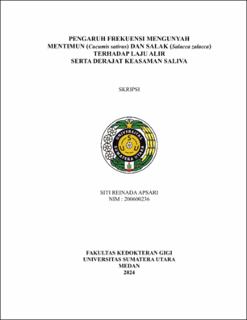Pengaruh Frekuensi Mengunyah Mentimun (Cucumis sativus) dan Salak (Salacca zalacca) terhadap Laju Alir Serta Derajat Keasaman Saliva
Effects of Chewing Frequency on Chewing Cucumber (Cucumis sativus) and Salak (Salacca zalacca) on Salivary Flow Rate and Acidity

Date
2024Author
Apsari, Siti Reinada
Advisor(s)
Tyasingsih, Filia Dana
Metadata
Show full item recordAbstract
Chewing plays a primary role in the process of food digestion and the perception of satiety. The speed of chewing can affect overeating tendencies and is associated with weight gain or obesity. Consumption of high-fiber foods such as Cucumber and Salak can help cleanse and stabilize saliva acidity (pH), thus maintaining oral cavity hygiene. Objective: to analyze the influence of differences in chewing frequency on the level of saliva flow rate (SFR) and saliva pH. Method: pre-experiment with a one-group pretest-posttest design. The sample consisted of 30 subjects divided into two groups of equal size. The first group chewed 16 times and the second group chewed 32 times. Each group chewed Cucumber and Salak on different days. Saliva collection was carried out before, at the 5th, 15th, and 30th minutes after chewing. Results: SFR and saliva pH were increased on the 5th minute after chewing Cucumber and Salak 16 times; SFR and saliva pH were increased on the 5th minute after chewing Cucumber 32 times. SFR also increased until the 15th minute after chewing Salak 32 times, while salivary pH only increased on the 5th minute; There was no significant difference in SFR after chewing Cucumber between 16 times and 32 times (p=0.167; p>0.05), but there was a significant difference in saliva pH (p=0.000; p<0.05); There was no significant difference in SFR after chewing Salak between 16 times and 32 times (p=0.376; p>0.05), but there was a significant difference in saliva pH (p=0.023; p<0.05). Conclusion: Chewing can increase Saliva Flow Rate (SFR) and saliva pH, but differences in chewing frequency do not yield significantly different results.
Collections
- Undergraduate Theses [1900]
